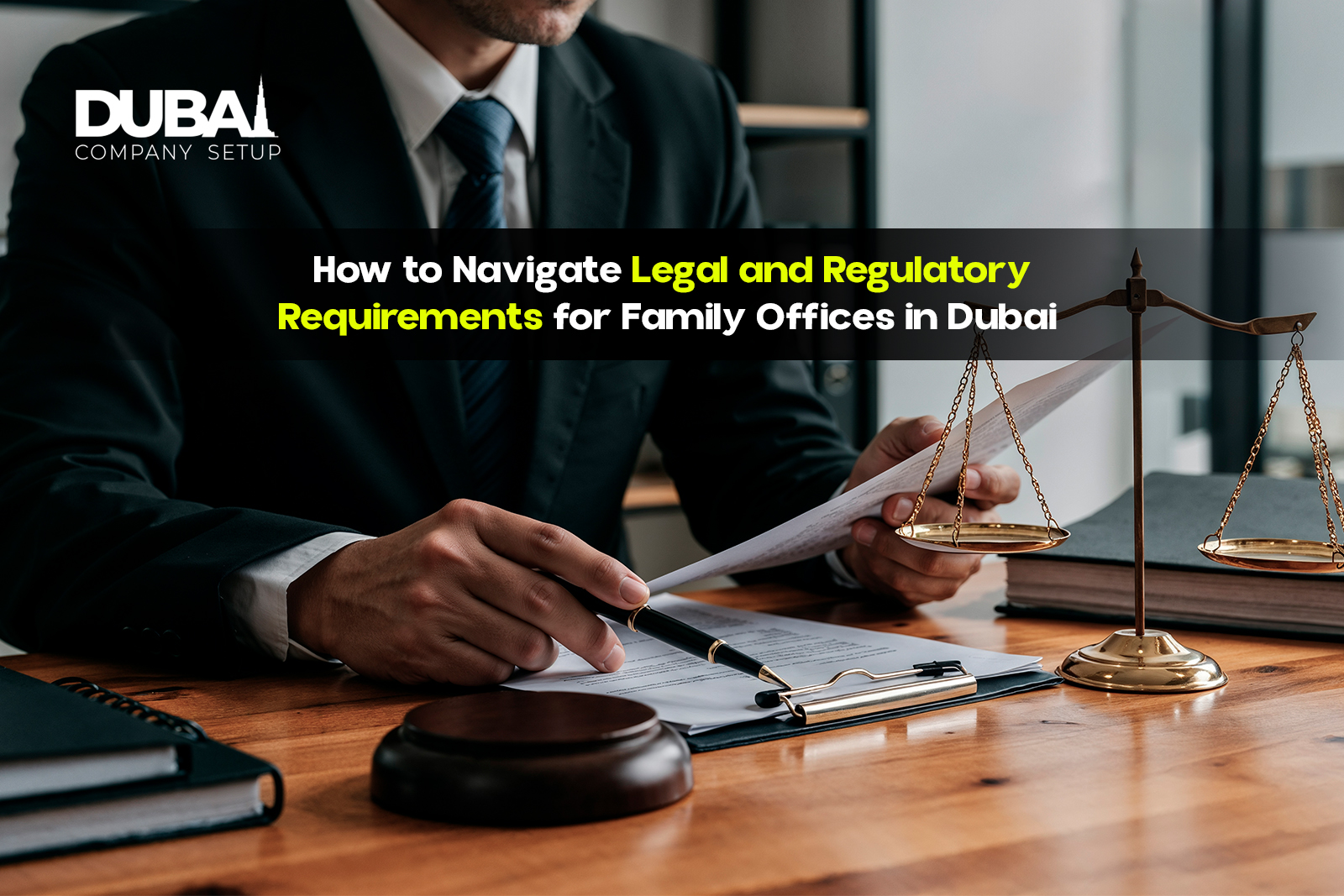Dubai has long been recognised as a global hub for business, offering robust infrastructure, business-friendly policies, and a tax-efficient environment. Among the various sectors flourishing in the city, family offices are becoming increasingly popular. These private wealth management entities serve high-net-worth families, helping them manage investments, wealth, estate planning, and even charitable initiatives.
However, setting up a family office in Dubai requires navigating a complex web of legal and regulatory requirements. This comprehensive guide will walk you through the key aspects of establishing a family office in Dubai, from regulations and compliance to taxation and governance, ensuring you are fully informed before embarking on this journey.
What is a Family Office?
A family office is a private wealth management firm that serves high-net-worth individuals (HNWIs) or families. It offers comprehensive services, including investment management, estate planning, tax planning, and governance. The objective is to preserve and grow the family’s wealth across generations.
There are two types of family offices:
- Single Family Office (SFO): A family office that serves one family or individual.
- Multi-Family Office (MFO): A family office that provides services to multiple families.
Family offices are structured to manage diverse portfolios and handle everything from private equity to real estate, ensuring that wealth is preserved, transferred, and increased across generations.
Why Choose Dubai for Family Office Setup?
Dubai has emerged as one of the most attractive destinations for family offices due to several reasons:
- Tax Benefits: The UAE offers a tax-free environment for many business activities, including family offices. There is no personal income tax, no capital gains tax, and no inheritance tax, making Dubai highly attractive for wealth management.
- Business-Friendly Environment: Dubai’s transparent regulatory framework and robust financial services sector make it an ideal destination for family offices.
- Global Connectivity: Dubai is strategically located, offering excellent connectivity to the Middle East, Africa, Asia, and Europe.
- Legal Protections: The Dubai International Financial Centre (DIFC) offers a well-established legal and regulatory framework for financial services, ensuring high levels of investor protection.
Navigating Legal and Regulatory Requirements for Family Offices in Dubai
To successfully establish a family office in Dubai, it is crucial to understand the legal and regulatory framework governing these entities. The regulatory landscape in Dubai can be complex, but with proper guidance, navigating these requirements becomes much more manageable.
1. Family Office Regulations in Dubai
The UAE does not have specific regulations solely dedicated to family offices; however, family offices are subject to securities regulations, banking laws, and corporate governance rules. For those setting up a family office in Dubai, the Dubai International Financial Centre (DIFC) provides a comprehensive legal structure.
- DIFC Family Office Laws: The DIFC is an international financial hub with its own legal system and judicial authority, independent from the rest of the UAE. The DIFC offers a sound regulatory framework for family offices that wish to operate within its jurisdiction. The laws governing family offices in the DIFC are aligned with international standards and offer substantial flexibility and security for investors.
- Family Office Licensing in Dubai: Family offices in Dubai need to acquire proper licenses to operate legally. This includes obtaining an appropriate investment management license or corporate services license, depending on the services offered. The Dubai Financial Services Authority (DFSA) regulates all financial entities in the DIFC, including family offices. Family offices must comply with anti-money laundering (AML) laws, including reporting requirements.
2. Family Office Setup in Dubai
The setup process for a family office in Dubai typically involves several steps:
- Choosing the Right Jurisdiction: The first step is to decide on the jurisdiction. While the DIFC is a popular choice, other free zones such as Dubai International Academic City (DIAC) or Dubai Silicon Oasis (DSO) may also offer suitable options, depending on your family office’s requirements.
- Corporate Structure: You can set up a family office in Dubai as a Limited Liability Company (LLC) or a Private Company. The family office will need to decide on its governance structure, ensuring that roles and responsibilities are clearly defined.
- Legal Documentation: Family offices are required to submit the necessary legal documentation, including incorporation documents, company policies, governance frameworks, and proof of identity for shareholders and directors.
- License and Registration: Family offices in Dubai must obtain the appropriate licenses based on their activities. This includes investment advisory services, estate planning, and asset management. The licensing process will be managed by the Dubai Department of Economic Development (DED) or the DFSA, depending on the location.
3. UAE Family Office Compliance
Compliance is a significant aspect of running a family office in Dubai. These offices must adhere to a wide range of compliance regulations to ensure they operate within the law:
- Anti-Money Laundering (AML) Regulations: Family offices must comply with the UAE’s stringent anti-money laundering laws. This includes conducting thorough due diligence on all clients, partners, and stakeholders.
- Economic Substance Regulations: Family offices engaged in activities that generate income must adhere to the UAE’s Economic Substance Regulations to avoid being considered a tax haven.
- Reporting Requirements: Family offices must adhere to financial reporting and disclosure requirements, ensuring transparency and compliance with the regulatory authorities.
4. Family Office Governance in Dubai
Good governance is crucial for the long-term success of a family office. Establishing a strong governance framework ensures that decisions are made in the best interest of the family, with clear roles and responsibilities for all involved.
- Family Constitution: A well-drafted family constitution helps define the vision, values, and operational guidelines for the family office. This document can also outline succession planning, dispute resolution mechanisms, and the involvement of future generations.
- Board of Directors: Many family offices establish a board of directors to oversee the operations of the family office, ensuring that governance practices are followed and investments align with the family’s goals.
- Family Governance Structure: This involves defining roles for key family members and external professionals (e.g., advisors, trustees) to ensure a balanced approach to decision-making.
5. Family Office Tax Regulations in Dubai
One of the main attractions for family offices in Dubai is the tax-friendly environment. The UAE offers various tax incentives that can help families preserve wealth, minimise tax liabilities, and plan for succession:
- No Income Tax: Dubai does not levy income tax on individuals, meaning that family offices can invest without the burden of income taxes.
- Capital Gains Tax: There is no capital gains tax in the UAE, so family offices can enjoy the full benefit of their investments.
- Inheritance and Estate Taxes: Dubai does not impose inheritance tax or estate duties, which is a significant advantage for families looking to pass on wealth across generations.
- Double Taxation Treaties: The UAE has signed double taxation treaties with numerous countries, which helps family offices avoid being taxed twice on the same income.
However, family offices should stay updated on any regulatory changes, as new laws, such as VAT (Value Added Tax), may apply to certain services provided by family offices.
6. Family Office Ownership Rules in the UAE
Understanding ownership rules is crucial for family offices, especially when it comes to structuring investments and managing assets. The UAE offers several benefits for foreign investors:
- Freehold Property Ownership: Foreign nationals can own property in designated freehold zones across Dubai. This is particularly advantageous for family offices interested in real estate investments.
- Ownership of Business Interests: Family offices may hold 100% ownership of their businesses in certain free zones and jurisdictions, such as the DIFC or Dubai Silicon Oasis.
7. Reporting and Transparency for Family Offices in Dubai
Dubai has specific reporting and transparency requirements that family offices must adhere to:
- Annual Financial Reports: Family offices must submit annual financial reports to the relevant authorities, ensuring transparency in their operations.
- Tax Reporting: While the UAE offers tax-free living, family offices must comply with reporting requirements related to their business activities and investments.
- Disclosures: Family offices must disclose certain financial information to regulatory bodies as part of the UAE’s economic substance and AML regulations.
The Path to Establishing a Family Office in Dubai
Navigating the legal and regulatory landscape for setting up a family office in Dubai can be complex, but with the right guidance, it can be an incredibly rewarding venture. Dubai offers a unique combination of tax advantages, business-friendly regulations, and investment opportunities, making it an ideal location for family offices.
To successfully establish and manage a family office in Dubai, it is essential to understand the various legal requirements, compliance obligations, and tax incentives available. Consulting with experienced legal and financial advisors can ensure that your family office is set up in the most effective way possible, providing long-term growth and security for your wealth.
If you are looking to set up a family office in Dubai, Vista Properties is here to help. Our expert team can guide you through the regulatory maze and ensure a smooth setup process.
FAQs
1. Can foreign investors set up a family office in Dubai?
Yes, foreign investors can set up a family office in Dubai, particularly in freehold zones like the DIFC, where foreign ownership is allowed.
2. What is the minimum investment required for a family office in Dubai?
There is no specific minimum investment for a family office in Dubai, but you must meet certain licensing and regulatory requirements. For the Golden Visa, an investment of at least AED 2 million in property is required.
3. What are the tax advantages of setting up a family office in Dubai?
Dubai offers a tax-free environment with no personal income tax, capital gains tax, or inheritance tax, making it highly attractive for family offices.
4. Are family offices in Dubai subject to AML regulations?
Yes, family offices in Dubai must comply with strict anti-money laundering (AML) regulations and conduct thorough due diligence on clients and transactions.
5. How long does it take to set up a family office in Dubai?
The setup time for a family office in Dubai typically ranges from a couple of weeks to a couple of months, depending on the complexity of the business and licensing requirements.









